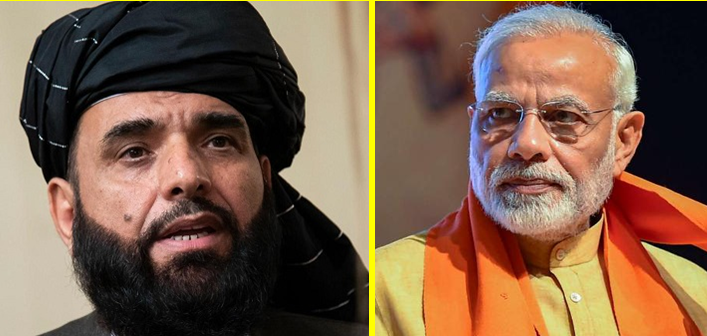In what shows that the Taliban is looking at reshaping its stand about India in Afghanistan, Taliban leader Suhail Shaheen has stated that India need not be wary of withdrawal of American forces from Afghanistan, during an interview with CNN-News18. The Taliban leader further said that Afghanistan would need India’s help in reconstruction in the period that he describes as ‘post-liberation’, if and when a Peace deal is signed with the United States.
When asked about the fears of the Taliban diverting its fighters to Kashmir, the outfit leader dismissed such concerns and suggested that there was no reason for the Taliban to divert its fighters towards India and help is needed in reconstructing Afghanistan.
The Pakistan-Taliban nexus is the reason why Pakistan was looking at the withdrawal of the US troops as a major diplomatic victory and India has felt serious apprehensions about the same. It would have meant a huge setback for India, had the US not canceled its peace talks with the Taliban last month. All the reconstruction efforts that India has made in the war-ravaged nation would have gone in vain.
The US might in all likelihood withdraw its troops, sooner or later. However, with the draw-down of the US forces and Trump’s insistence on India playing a bigger role in Afghanistan, the Taliban has realised that it can no longer remain opposed to India.
The Trump administration is aware of India’s apprehensions and this has become an obstacle for the Taliban to achieve its goal, that is, the withdrawal of US troops. Taliban may want New Delhi to soften its stance so that they can arrive at a much craved peace deal.
Taliban remains close to Pakistan as was illustrated by the recent meeting between Pakistan PM Imran Khan and top Taliban military commander Mullah Baradar. However, Taliban seems to have realised that India’s diplomatic offensive against Pakistan has isolated and enfeebled it globally. With a weak economy and threat of strong action by global terror financing watchdog, FATF looming large over Pakistan, it cannot be expected to play a significant role in Afghanistan.
While the Taliban remains close to Pakistan, it is trying to send across the message that proximity to Pakistan does not mean opposition towards India. This stance also explains why Taliban has also distanced itself from the Kashmir issue and slammed Pakistan’s attempts to link the Indo-Pak tensions over Kashmir with the situation in Afghanistan.
This sudden reshaping of Taliban’s stand towards India, which is traditionally seen as emboldening Pakistan’s anti-India agenda emanates out of the realisation that India has emerged as a global power that cannot be ignored. India has gained massive diplomatic capital in the past five years or so and today it is exerting influence in many areas. If one were to look into India’s influence in the Taliban in particular, it is clear that India remains the single largest contributor towards the cause of reconstruction in Afghanistan. As per the latest Pentagon report submitted to the US Congress, India remains the largest regional donor in Afghanistan having contributed US $3 billion in aid since 2001. The report has also stated that India is likely to continue supporting Afghanistan even in event of the US withdrawing its troops from the war-torn country.
India’s contribution towards reconstruction in Afghanistan has made it hard for anybody to ignore its role in the country and Taliban too has realised that India can no longer be ignored when it comes to reconstruction in the war-torn county. Ever since the US-led NATO troops took on the extremist Taliban regime and toppled it after the attacks in the USA on September 11, 2001, India has been involved in rebuilding and reconstruction efforts in Afghanistan, as well as in maintaining peace and security. India’s aid to the war-ravaged nation has figured in terms of infrastructure projects, humanitarian assistance, economic development, capacity building and empowering Afghanistan’s security personnel, and enhancing connectivity.
Pakistan has been staunchly opposed to India’s presence in Afghanistan. Pakistan’s efforts of creating a strategic asset out of the Taliban date back to 2001. Since then Pakistan has been funding and providing safe havens to Taliban fighters. It was only due to Pakistan’s misuse of US aid towards funding terrorism and supporting the Taliban that the US was unable to defeat the Taliban militarily. By maintaining close relations with the Taliban and also contributing its rise, Pakistan has attempted to pursue one of its major geopolitical goals, viz. gaining influence in Afghanistan.
It is believed that once Pakistan achieves its goal on the Afghanistan front, it is going towards divert its Jihadi terror groups to Kashmir and focus all its energies on ‘bleeding India with a thousand cuts.’
Taliban is hopeful of finding its way back to Kabul either indirectly in the form of a weak coalition government supported by the outfit or directly as the administrators of the country, even as the US is looking to exit the war-torn country. The outfit already controls nearly 70 percent of the country, either directly or indirectly. This coincides with the realisation that India cannot be ignored primarily because of its massive rebuilding efforts in Afghanistan and also the global standing that India enjoys. Therefore, the Taliban has now started lobbying for India’s goodwill and attention, notwithstanding its close ties with Pakistan.
